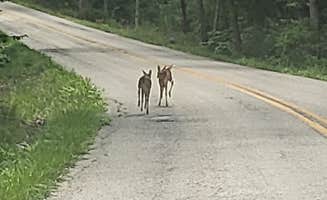Equestrian camping near Denniston, Kentucky offers access to several well-maintained trail systems across the Daniel Boone National Forest. The region sits at approximately 900 feet elevation with limestone karst topography creating unique riding terrain through hardwood forests. Most horse camps in the area experience seasonal closures during winter months when trail conditions deteriorate following heavy rainfall.
What to do
Cave exploration from horseback: Carter Caves State Resort Park Campground maintains over 30 miles of bridle trails connecting riders to natural limestone formations. "The park has a lot to do hiking, fishing, caves and caverns to explore. Campgrounds was clean. You will need extra water hose and extension cords to get hooked up in a lot of the sites though," notes camper Ron & Bonnie D.
Mountain biking alongside equestrian trails: At Twin Knobs Recreation Area, riders can access shared-use trails suitable for both horses and bikes. "There are mountain biking trails that you can access right from the campground so that was nice. You can also go on a short hike up one of the knobs," writes Bounding Around, who appreciated the diverse trail options.
Overnight lake rides: Equestrians camping at Jenny Wiley State Park Campground can take extended trail rides around Dewey Lake. "There are tons of sites for backcountry camping throughout the park. These are primarily situated around Dewey Lake. I have never actually stayed in the camping facilities as it's always seemed more fun to go 'off grid' and visit a more private site," reports Carrie J.
What campers like
Privacy between sites: Campers appreciate the natural spacing at many equestrian campgrounds. "The campground is in a wooded area and each campsite is separate by woods from the nearby sites. There are shower and toilet facilities close by. The campground is located on a lake," notes Stephen H. about Twin Knobs Recreation Area.
Well-drained camping surfaces: S-Tree Campground provides gravel tent pads that handle rainfall efficiently. "You camp on rock sites so it drains great if it rains. The sites are kinda secluded from one another by tree and bush lines," explains Kellie Dawn T., highlighting practical features for horse camping.
Off-grid options: Riders seeking solitude favor more remote camping areas. "Really loved staying here- close enough to the beautiful hikes and climbs of the area, and far enough to feel really private and woodsy. Since it was so warm, we took a dip in the lake," writes Lena L. about her experience at Lago Linda Hideaway.
What you should know
Extended hose requirements: Many equestrian sites require extra equipment. "What's odd is that you share a water spigot with a neighbor so you have to have a long hose to go across your whole section," notes Pamela S. about Jenny Wiley State Park.
Tick prevention essential: Horse camps require careful tick checks. "I will say we found a few lone star ticks (dead thanks to her prevention) on our dog. Just as a heads up to campers. Always do your tick checks!" warns Lena L. from Lago Linda Hideaway.
Road conditions vary seasonally: Access to some horse camps requires careful planning. "The northern road in isn't all that bad, but the south road is what I NEEDED to use to get to my various destinations, and it was a rough one. I made it in and out twice in an HHR, but I was bottoming out on gravel and such," reports Andrew G. about S-Tree Campground.
Tips for camping with families
Campground selection for children: When bringing kids to equestrian areas, choose sites with additional activities. "Good to stay for a relaxing weekend with you're family. Nice spots by the lake and includes and beach area with a little store for any last minute supplies you may have forgotten," recommends Megan D. about Twin Knobs.
Shower facilities differ significantly: Equestrian Campground — Carter Caves State Resort Park provides modern facilities, while other horse camps offer only vault toilets. "The shower and bath house was clean, could use updating but overall acceptable," explains Karen P.
Plan for limited connectivity: Cell service varies widely among equestrian campgrounds. "We try and use horse camps when traveling in larger groups since they have more space and are not always used. Since we didn't have horses I can't speak entirely on the how well the horse amenities are but the place was clean, restroom facilities were stocked with TP. There was slight cell service for Verizon & AT&T, enough for maybe text but not very consistent," reports John about White Sulphur Horse Camp.
Tips from RVers
Site length limitations: Most equestrian camps have site restrictions. "The area for RV's is a little tight in the trees and probably won't accommodate an extremely large vehicle. However, there is a huge open field on further into the camp that should be fairly easy to turn around in," advises Heather K. about Lago Linda Hideaway.
Water access challenges: RVers should prepare for distance to hookups. "Lovely site, totally private, on the lake, but really inconvenient if you want water hookup," notes Becky H. about Twin Knobs Recreation Area.
Electrical requirements: Many equestrian camps offer limited electrical options. "Make sure to check in the details, which sites have sewer as they don't label it full hookups up front. The line of sites along the road into the campground all have sewer holes," advises Amanda S. about Carter Caves State Resort Park.


